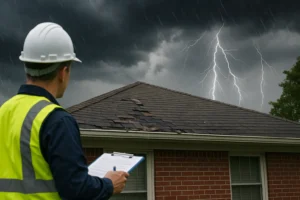Navigating an insurance claim can feel like entering a maze—confusing, frustrating, and full of dead ends. One of the most common points of confusion? Understanding the difference between an insurance appraiser vs adjuster. These two roles may sound similar, but they serve very different purposes—and knowing which one you need can make or break your claim.
At TX Insurance Appraiser, we hear this question all the time from Texans: “Should I get an appraiser or work with the adjuster?” The answer depends on where you are in the claims process—and what kind of results you’re getting.
This article breaks down exactly who does what, when to involve each one, and how to protect your bottom line when things start to go sideways.
Let’s dig into it—without the fluff.
Role Definition
Let’s start simple: Adjusters adjust. Appraisers appraise.
But what does that really mean?
An insurance adjuster is typically your first point of contact after you file a claim. They’re the ones who come out to your property, take photos, ask questions, and begin crunching numbers. Their job? To interpret the insurance policy and determine how much the insurance company should pay—based on coverage, liability, and the insurer’s internal guidelines. In many cases, this person is either employed directly by your insurance provider or works for them through a third-party vendor.
In Texas, we also have public adjusters, who do similar work but for the policyholder instead of the insurer. They help advocate for you, but they still operate within the bounds of interpreting the insurance policy.
A claims appraiser, though, serves an entirely different purpose. They don’t dig into your policy or decide what is or isn’t covered. Their role begins where the conflict starts—when there’s a disagreement about how much the damage is worth. The appraiser’s job is laser-focused: determine the accurate, fair market value of the loss. That’s it. No legal wrangling. No policy fine print. Just valuation.
If you’ve ever been handed a claim offer that seemed way too low, and you’ve said, “That’s not even close to what it’ll cost to fix this,”—that’s when a claims appraiser steps in. And at TX Insurance Appraiser, that’s exactly where we shine. We focus on the numbers that matter, not the legalese that doesn’t.
Who They Represent: Insurance Appraiser vs Adjuster
Adjusters usually work for the insurer. Their paycheck comes from the very company responsible for paying your claim. It doesn’t necessarily mean they’re trying to shortchange you, but let’s be real: they have a financial incentive to interpret damages and coverage in a way that limits liability for the insurer. Some adjusters are fair and diligent. Others? Not so much. They’re employees or contractors bound by the insurer’s policies, training, and internal protocols—which often means leaning toward cost containment.
On the flip side, public adjusters work on behalf of the policyholder. They’re a better option if you want someone advocating for you from the beginning of the claims process. Still, their role is limited to navigating the policy and trying to negotiate with the insurance company. They can’t enforce a value if the insurer disagrees.
Appraisers are different. They come into play only when there’s a significant disagreement about the value of a loss—typically after an adjuster has already made an offer. At that point, both sides (you and the insurer) appoint your own appraisers. These professionals are meant to be neutral, competent, and focused solely on the number—not the policy, not the legal implications—just the actual cost to repair, replace, or recover your property.
And if the two appraisers don’t agree? That’s where an umpire steps in—a neutral third party who reviews both assessments and breaks the tie. This trio is what makes up the formal appraisal process. It’s built to remove emotion, bias, and policy interpretation from the equation and zero in on one thing: the fair value of your loss.
Licensing and Regulation (Texas)
Here in Texas, insurance adjusters are licensed by the Texas Department of Insurance. There are different types—staff, independent, and public adjusters. Some need to pass exams and undergo continuing education.
Appraisers? Not so much. There’s no licensing body in Texas that specifically certifies appraisers for property claims. That said, competence, independence, and experience are non-negotiable. Many credible appraisers follow USPAP standards (Uniform Standards of Professional Appraisal Practice).
Our team at TX Insurance Appraiser meets those standards. Because when it’s your home or business on the line, experience matters.
When They’re Involved: Insurance Appraiser vs Adjuster
Adjusters are the first on the scene once a claim is filed. They’re your initial point of contact in the claims process. Here’s what they typically do:
- Inspect the property damage
- Document losses with photos and notes
- Interview the policyholder and any relevant witnesses
- Determine the scope of the damage
- Prepare an initial offer based on their evaluation and the insurance policy
This is often where policyholders assume the process ends—once the adjuster makes an offer, that’s the final word. But that’s not always the case.
Appraisers don’t get involved unless there’s a serious dispute—specifically about the value of the loss. For example:
- The insurer offers $15,000 for storm damage repairs
- Your contractor estimates $40,000
- That’s not a minor gap—that’s a major disagreement
When the insurer refuses to budge, and their offer doesn’t come close to covering your loss, this is when the appraisal clause in your policy comes into play.
Here’s how the appraisal process typically unfolds:
- You choose your own appraiser
- The insurance company appoints theirs
- Both appraisers try to agree on the value of the loss
- If they can’t agree, they bring in a neutral third-party umpire
- A decision agreed upon by any two of the three parties is legally binding in Texas—unless there’s fraud or misconduct involved
This process bypasses lawsuits and stalled negotiations, offering a quicker, more definitive resolution. When done right, it gives policyholders a fair shot at a real settlement that reflects actual damages—not just what the insurer is comfortable offering.
At TX Insurance Appraiser, we’ve guided Texans through this exact process—whether you’re in a rural farmhouse or a high-rise downtown. Knowing when to invoke the appraisal clause is crucial, and knowing who to hire is just as important.
Scope of Authority
Here’s the real kicker—and one of the most important distinctions in the entire claims process.
Adjusters wield a broad range of authority. They’re the ones who:
- Interpret the terms and limitations of your insurance policy
- Determine if your claim is covered under that policy
- Investigate the cause and extent of the loss
- Assign liability, when relevant
- Calculate a proposed settlement amount on behalf of the insurer
In other words, adjusters wear multiple hats—part investigator, part policy expert, part negotiator. And because they often work directly for the insurance company, their decisions can heavily influence what you’re ultimately paid.
Appraisers, on the other hand, have a much narrower—but no less critical—role. We don’t interpret policies. We don’t decide whether your damage is covered. That’s not our job—and frankly, we don’t want it to be.
Our only responsibility? Determine the actual dollar value of your loss. That’s it.
We walk the property, review repair estimates, consult industry standards, and apply real-world market values to your specific damages. Our independence from the coverage side of the claim is what makes us powerful. We offer an objective, fact-based assessment that can’t be skewed by policy interpretation or internal pressure from an insurer.
This division of responsibility is why the appraisal process works. The appraiser isn’t there to argue. We’re there to value. And when the insurance company isn’t seeing eye-to-eye with you, that unbiased perspective can be the key to a fair resolution.
Claims Process Participation: Insurance Appraiser vs Adjuster
Think of adjusters as the main player on the field from the moment the claim is filed. They’re often the first person you’ll deal with after a loss, and their responsibilities span multiple stages of the process. Typically, they:
- Inspect and document the damage to your property
- Interview you and possibly other witnesses
- Review the terms of your insurance policy
- Coordinate with contractors, engineers, or specialists for assessments
- Prepare and propose a settlement amount based on their findings and the policy’s limits
If you hire a public adjuster—one that works for you rather than the insurance company—they can also help you file the claim, gather evidence, and negotiate with the insurance carrier. Public adjusters are especially valuable when the claim is complex or if you’re unsure how to communicate with the insurer effectively. They act as a guide and advocate through the entire process.
Appraisers, on the other hand, don’t come in unless there’s a problem. They’re not involved in the initial claim filing or policy interpretation. They step in only when there’s a dispute over the value of the loss—and usually after you’ve already gone through the adjuster process and aren’t satisfied with the outcome.
Appraisers are not there to manage the claim—they’re there to resolve the numbers dispute. They evaluate the damage independently, compare it to industry pricing, and aim to reach a fair and accurate dollar amount. Once their job is done, they step out of the process.
Their role is narrow, but crucial—especially when negotiations have stalled, and you need a clear, unbiased valuation to move forward.
Use of Third Parties: The Umpire
Let’s say the two appraisers—yours and the insurer’s—review the damage, run the numbers, and just can’t agree on a fair value. What now?
That’s when a third party steps in: the umpire.
Think of the umpire as the tiebreaker in the appraisal process. This neutral, mutually agreed-upon individual reviews both appraisers’ assessments, examines the evidence, and makes a final call. The goal isn’t to split the difference—it’s to determine a value that reflects the true extent of the loss based on facts and expert judgment.
The umpire doesn’t represent you or the insurer. Their role is to remain impartial, listen to both sides, and issue a decision that at least one appraiser agrees with. In Texas, if two of the three—either both appraisers or one appraiser and the umpire—agree on a value, that number becomes binding.
This process is far less expensive and time-consuming than going to court. It’s structured, but not overly formal. And best of all? It’s designed to move things forward—especially when negotiations have stalled.
At TX Insurance Appraiser, we’ve worked with experienced, reputable umpires across Texas. We know how to prepare solid appraisals that hold up—and get results.
Industry Confusion (Especially in Auto Claims)
In the auto insurance world, things get murky. Many insurance companies blur the line between appraisers, damage estimators, and adjusters. Staff often don’t know the official standards for appraisal work, and consumers get the short end of the stick.
At TX Insurance Appraiser, we do know the standards. And we use them.
It’s why so many Texans trust us after they’ve been handed a lowball offer. We know how to cut through the noise—and get you real value.
When to Choose Which
Here’s the million-dollar question: Who should you call—and when?
Understanding the timing and role of each professional can save you thousands of dollars and months of stress.
- If you haven’t filed your claim yet, or you feel overwhelmed by the paperwork and policy jargon, a public adjuster may be your best first step. They can help you understand what’s covered, gather documentation, file your claim properly, and negotiate directly with the insurance company on your behalf.
- If your claim has already been processed, and you’ve received a settlement offer that feels too low—or flat-out wrong—then it’s time to bring in a claims appraiser. Appraisers are ideal when the dispute is strictly about the amount of the loss, not whether it’s covered.
- In some situations, you may need both. A public adjuster can guide you through the early stages, while an appraiser becomes essential when negotiations stall and the appraisal clause must be invoked to resolve a valuation disagreement.
At TX Insurance Appraiser, we specialize in that critical moment—when the process breaks down and the numbers don’t add up. We’re here when the system starts to feel rigged. When you’re tired of emails going unanswered. When you’re told “that’s the best we can do” and you know it isn’t.
We step in to rebalance the equation—professionally, accurately, and on your terms.
Because knowing who to call is important. But knowing when to call can make all the difference.
Frequently Asked Questions (FAQs)
An adjuster interprets your insurance policy, determines coverage, and suggests a settlement. An appraiser only calculates the value of the damage—they don’t deal with coverage.
Usually, the insurance company hires the adjuster. If you hire your own, they’re called a public adjuster and work for you, the policyholder.
Both you and your insurance company each hire your own appraiser when there’s a dispute over the value of a loss.
Hire an appraiser after you receive a settlement offer that you believe is too low. They’re used when there’s a disagreement about the value of the loss.
No. Appraisers do not interpret coverage. Their job is to determine how much the damage is worth.
A neutral umpire is brought in. If two out of the three (either appraisers or the umpire) agree on a value, that decision is binding.
Yes. In Texas, appraisal decisions are legally binding unless there’s evidence of fraud or misconduct.
Yes. A public adjuster can help you through the process. An appraiser steps in if the claim hits a wall due to a value dispute.
We specialize in representing you, not the insurance company. We help Texans get fair, independent valuations when they’ve received lowball offers.
Conclusion: Insurance Appraiser vs Adjuster
Dealing with an insurance claim shouldn’t feel like a battle. But too often, it does. Understanding the difference between an insurance appraiser vs adjuster gives you an edge. It helps you ask the right questions. It helps you demand better answers.
And if you’re in Texas? You’re in luck. TX Insurance Appraiser is here to help you get what you deserve—no more, no less. Reach out to TX Insurance Appraiser today. Because your claim deserves more than a lowball offer.






